
The warm and nutty aroma of nutmeg can remind you of precious occasions that you spent with your loved ones. No wonder this ingredient is used in preparing several kinds of baked goods, vegetables, puddings, sauces, beverages (eggnog), etc. But what if you are in the mood for some of its sweetness but you find an expired packet of it?
While nutmeg takes a lot of time to go bad, it will eventually degrade in terms of quality and taste. Usually, the whole nutmeg spice can keep its quality for up to four years in the pantry, and the ground nutmeg retains its quality for two years.
But there’s much more to play with, like its shelf life and how you can increase it with the correct storage techniques. If that intrigues you, continue reading as you shall be introduced to several other pieces of information about nutmeg that can help you in the future.
How Long Does Nutmeg Lasts?
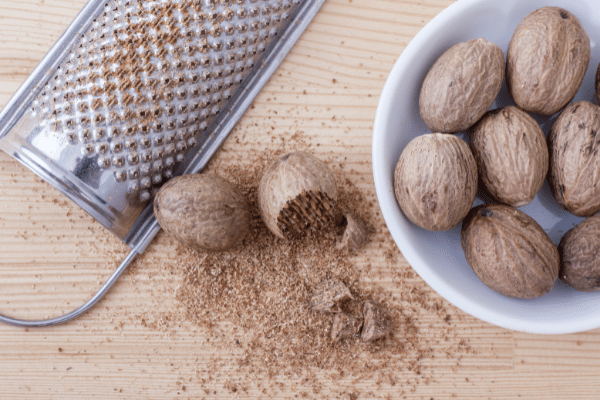
The Nutmeg has a long shelf-life, thanks to the drying process. The whole nutmeg sustains its quality longer compared to the ground nutmeg. The grinding process exposes the surface area of nutmeg to air and oxygen, and over time, the flavor and taste degrade.
Only the seed’s surface is exposed to air in the whole nutmeg, but after grinding, every single bit of powder is exposed. All spices come with a use-by date, and it is slightly useful. But it is just an estimate as most of the spices retain their aromas and flavor longer than the best-by date.
You can assume that whole nutmeg seeds sustain their freshness and aroma for up to four years. However, the ground nutmeg powder sustains its quality for only two years, provided that it is away from moisture and water.
It is worth mentioning that nutmeg loses its flavor and quality over time. It means after a couple of years of storage, the aromas and flavors won’t be as strong as they used to be when you first bought them.
| Nutmeg Types | Pantry | Refrigerator |
| Ground | Two Years | Two to Three Years |
| Dried | Four Years | Three Years |
| Whole | Four to Five Years | Five Years |
These are the estimates for the best quality of nutmeg. But the whole nutmeg will last longer and stay safe even after the best-by date.
How Can You Tell if Nutmeg Is Bad?
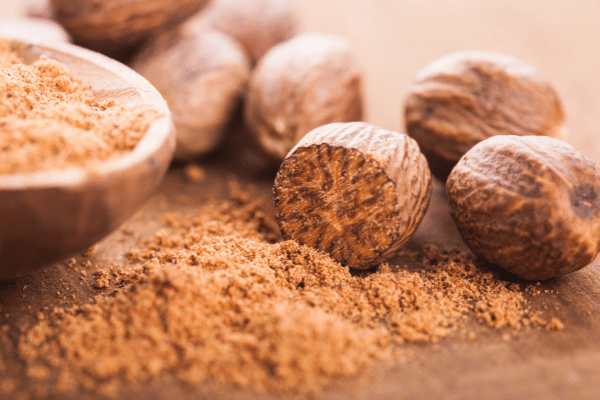
Despite having a longer shelf-life of up to five years, it is prone to spoilage, especially when it comes in contact with moisture and water. Keeping your nutmeg haphazardly will heighten the chance of mold or other organic growth. Other noticeable signs of spoilage will help you know if your nutmeg has gone bad.
Formation of Mold
As the packet of whole or powdered nutmeg comes in contact with water or moisture, bacterial growth starts. You will see clustered and permeable surfaces referred to as mold formation.
Exposure to moisture leads to spoilage of nutmeg. So, when you see mold formation in the packet, consider it unsafe for consumption, and hence you must discard it.
Smell Test
Before using the spice in your recipe, you must conduct a smell test. If you notice that the whole or ground nutmeg packet is releasing foul or off-smell, it is an alarming sign of spoilage.
You must discard the packet immediately as it is no longer healthy for consumption.
Potency Check
As mentioned earlier, the flavor and aromas of nutmeg start diminishing over time. So, before using the nutmeg in your recipes, ensure to check the potency of the spice.
To check the potency, you have to take some ground nutmeg on your palm, rub it using the other palm, and smell and taste it. If the aroma and flavor don’t radiate the original smell, it means the spice has gone bad. It is still safe for consumption, but the aromas and flavor will be compromised.
Is it okay to use expired Nutmeg?
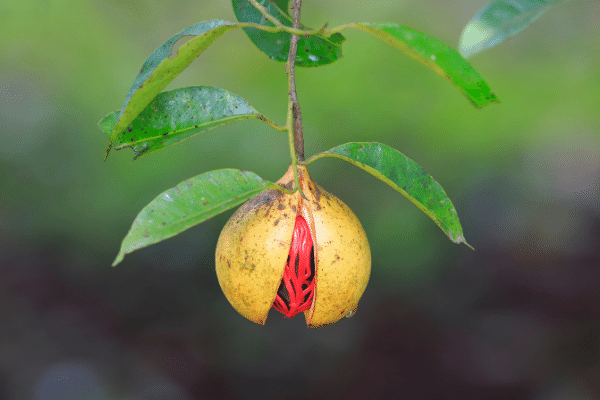
Nutmeg doesn’t go rancid easily as it has a longer shelf-life. Therefore, it is safe to consume the spice even after its expiration.
But, if you are using old and bad nutmeg in your recipe, there will be zero flavor and aromas in your dish. To enjoy the punch and original aroma, you must use fresh and new nutmeg.
Aflatoxins are metabolites of mold. They are considered carcinogenic for the human body. According to research, the grounded nutmeg comprises aflatoxins and mycotic, and these metabolites can be a breeding ground for molds and other contaminants.
Consuming bad nutmeg may cause respiratory disorders and other allergic reactions in some people. So, you must ensure proper storage of the spices to save and use them safely even after their expiry.
If the grounded nutmeg is not exposed to high heat and moisture during storage, consuming it after expiry is safe and not risky.
Can You Freeze Nutmeg? Refrigerated Vs. Shelf-Stable
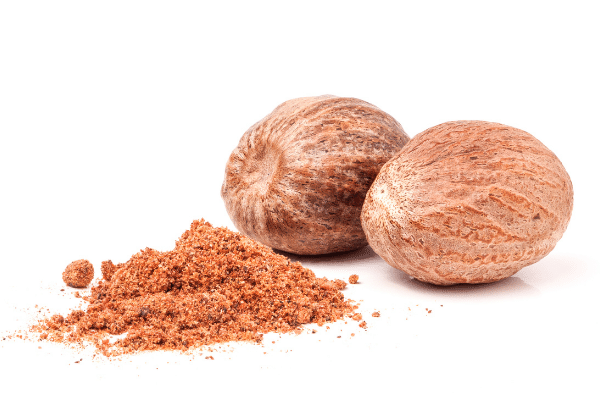
Nutmeg is not a good choice for freezing as it won’t extend the shelf-life. Instead, the quality will degrade quickly when you freeze it because of extreme cold temperatures. Nutmeg must be stored in an air-sealed container in cool and dry places, whether grounded or whole.
It will keep its aroma and flavor longer, even when stored at room temperature. Freezing may increase the chance of condensation in the container, especially when you take out the container often to use. It will fasten the process of losing its taste and aroma from the spice.
But, if you don’t have any option rather than freezing, you have to follow a few simple instructions.
- Use an air-tight container to store nutmeg in a freezer. It will help keep the moisture out of the container.
- Consider freezing the whole nutmeg rather than freezing the grounded counterpart, as whole nutmegs are less fragile. It will last longer, and if it is frozen properly, it may last up to five years.
Refrigerated
Nutmeg doesn’t belong in a refrigerator. It keeps the quality, flavor, and aromas longer even when stored properly at room temperature. The average temperature of a refrigerator is very cold for the nutmeg, be it grounded or whole.
The average temperature of a fridge is cold, and it will cause mold growth on the spices. As mentioned earlier, the temperature leads to condensation, and it accelerates mold growth.
But, you can store it in a fridge in an air-sealed container. However, keeping it in the kitchen cabinet and pantry drawer is sufficient to keep its quality.
Shelf Stable
Nutmeg, whether whole or ground, must not be exposed to extreme cold, heat, or sunlight. So, you must keep the spice properly in an air-tight container. The properly stored nutmeg in the pantry drawer or kitchen cabinet would last up to five years.
Keeping the spice in the open will only last for a couple of months. It will start degrading and lose its potency over time. Moisture and water are the major culprits in promoting mold growth. So, ensure that the spice is kept in places away from moisture, water, and extreme heat.
How to Store Nutmeg?
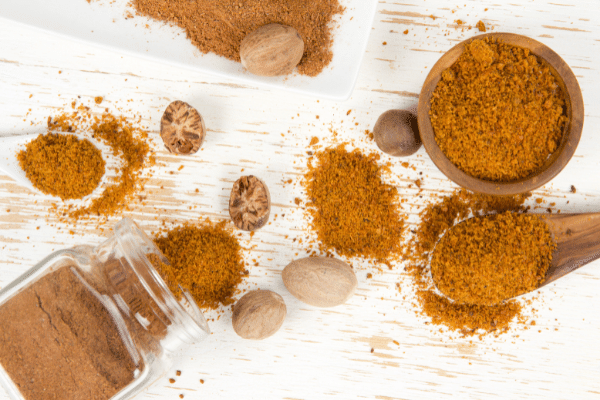
Proper storage of nutmeg is not very demanding as it is effortless. You have to follow a few simple instructions to make it last longer and retain its flavor and aroma for years to come. Here is the list of a few storage tips for nutmeg.
Store Away from Sunlight, Moisture, and Heat
As mentioned earlier, moisture and water is the major degrader. As it comes in contact with moisture and water, mold formation starts due to condensation. So, avoid overexposure to direct sunlight, heat, and moisture to sustain its flavor and potency for years to come.
Store the grounded or whole nutmeg in cool and dark places in your kitchen cabinet or pantry.
Use Air-Tight Containers
Whether grounded or the whole nutmeg, you must use an air-tight or sealed container to store them. Sealable bags or zip-lock bags are the best choices to store the spices.
Ensure creating a vacuum inside the air-tight container or sealable bag to push out the extra air before storing.
Avoid Freezing or Refrigerating
Nutmegs need no refrigeration to keep their quality for years at room temperature. Freezing or refrigerating the nutmeg may degrade its flavor and quality. The humidity level inside a freezer or fridge is high. It degrades the quality.
Store Whole Nutmeg Instead of Grounded Nutmegs
If you plan to store the spice longer, purchase the whole nutmegs instead of grounded powder.
Since the high surface area is exposed in grounded nutmeg, it quickly loses its aroma, flavor, and potency. Avoid storing the grated nutmeg, as you must grate it when needed to cook your recipes.
Besides, grounded nutmeg comprises aflatoxins, which can be harmful to your body. So, always purchase the whole nutmeg and not the grounded nutmeg.
Never Use Wet Spoon for Measurements
It is a basic tip to extend nutmeg’s shelf-life.
- You must not use a wet spoon to measure the nutmeg for cooking.
- It will keep its quality and prevent the degrading of the grounded nutmeg.
Health Benefits of Nutmeg
Along with its warm and nutty taste, nutmeg brings several health benefits to the table.
For starters, it is a potent source of antioxidants that helps your body fight against cancer, health problems, and liver issues. The presence of fiber ensures a smooth digestive system. Moreover, it contains other essential nutrients like Vitamin A, C, E, iron, zinc, etc., to maintain your overall health.
Apart from that, nutmeg also prevents bad breath and oral diseases with its antibacterial properties.
Lastly, you can also use it to improve your mood and get better sleep.
What are the Alternatives to Nutmeg if it has gone bad?
In case you miss the nutty taste of nutmeg, but the one in your pantry has gone bad, you can use the following alternatives:
- Cinnamon
- Apple pie spice
- Pumpkin pie spice
- Cloves
- Ginger
Frequently Asked Questions
Does Ground Nutmeg Last Longer Than Whole Nutmeg?
No, the whole nutmeg has a longer shelf-life than grounded nutmeg. It is suggested to grind the whole nutmeg fresh whenever you need it for cooking. It comes in a shell that you must break and discard. The shell will help sustain its quality and flavor longer.
Is There Any Expiry Date for Nutmeg?
Spices never expire per se. But, they come with a best-by date. If properly stored, the grounded nutmeg sustains its quality for up to three years, and the whole nutmeg in the shell can keep the flavor and aromas for up to five years. However, these are just the best-by date and not the expiry dates. After checking the spoilage signs, you may consume it even after expiry.
Can You Eat Nutmeg After the Expiration Date?
Yes, consuming nutmeg after a best-by date or expiry is considered safe, provided that it is properly stored as suggested. Nutmeg lasts beyond the best-by date, and consumption is safe after the expiry date, provided that it sustains the original flavor, aroma, and quality.
Can expired Nutmeg make you sick?
If you do not follow the proper storage techniques, consuming those expired nutmegs can cause food poisoning. So, it is always advisable to toss them out.
The Bottom Line
Adding a pinch of grounded nutmeg in any recipe can make your meal flavorsome. But, logically, it is not always a good idea to store nutmeg in bulk in your pantry or kitchen cabinet.
But, storing the whole or grounded nutmeg properly can extend its shelf-life for up to five years. However, like other spices, nutmeg tends to go rancid, and it becomes essential to check the spoilage signs before using it.
If you are fully equipped with the required knowledge of storage, spoilage signs, and shelf-life of nutmeg, you may go for it.



